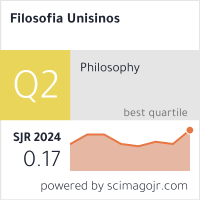A review of Aristotle’s claim regarding Pythagoreans fundamental Beliefs: All is number?
DOI:
https://doi.org/10.4013/fsu.2016.171.06Resumen
The question-statement, “All is number?”, the title of Zhmud’s famous 1989 article in Phronesis, opens a challenge to the extremely important Aristotelian testimony that “all is number” was the fundamental definition of Pythagorean philosophy. Such a challenge is anything but easy, especially when one considers that, so far, the histories of both ancient philosophy and ancient mathematics seem to have no doubts that this definition is correct. This paper aims to submit Aristotle’s claim that the Pythagoreans believed that “all is number” to critical review. Our analysis of the many ways in which Aristotle states the thesis that “all is number” will reveal, beyond merely semantic variations, a fundamental theoretical contradiction that Aristotle himself seems incapable of solving. Three different versions of the doctrine are in fact present in the Aristotelian doxography: (a) an identification of numbers with the sensible objects; (b) an identification of the principles of numbers with the principles of things that are; (c) an imitation of objects by numbers. While versions (a) and (c) seem to identify numbers with the material cause of reality, in terms (“imitation”) reminiscent of Plato, version (b), numbers as formal causes of reality, is an Aristotelian reconstruction of the Pythagorean theory. Aristotle would have been pushed to such a reconstruction by the difficulty he found in accepting the Pythagorean material notion of number, and by considering it closer to its sensitivity, strongly marked by the reception of that same theory in the Academic realm.
Keywords: Ancient Philosophy, Pythagoreanism, Aristotle, numbers, ontology.
Descargas
Descargas
Publicado
Cómo citar
Número
Sección
Licencia
Concedo a revista Filosofia Unisinos – Unisinos Journal of Philosophy o direito de primeira publicação da versão revisada do meu artigo, licenciado sob a Licença Creative Commons Attribution 4.0 (que permite o compartilhamento do trabalho com reconhecimento da autoria e publicação inicial nesta revista).
Afirmo ainda que meu artigo não está sendo submetido a outra publicação e não foi publicado na íntegra em outro periódico e assumo total responsabilidade por sua originalidade, podendo incidir sobre mim eventuais encargos decorrentes de reivindicação, por parte de terceiros, em relação à autoria do mesmo.










